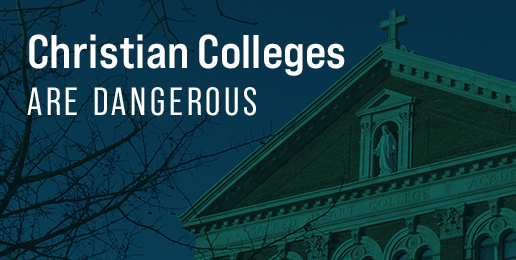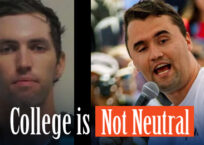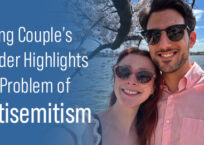
I recently reviewed a talk by Jay Seegert from The Starting Point Project, and if you’re entering college soon or you know someone who is, take an hour out of your day to glean from Jay’s wisdom.
He has a lot to offer and is a very accessible speaker. He’ll help you find the core disagreements between you and the world, offer tips for conversations with hostile unbelievers, and even give some street wisdom specifically for the college environment.
Among all the great points in Jay’s talk, however, one in particular jumped out at me.
“I grew more spiritually at the state university than I did at the Christian college, bigtime. And it’s even worse, probably, today… More damage can be done at a Christian university than at a state university.”
Jay went on to elaborate. At a state university, he said, you expect the professors to be atheists and teaching students lies. But at a Christian university, you tend to expect the kids to “be at church 24/7!”
So you’ll probably be somewhat unprepared for that Old Testament professor teaching that the Bible is “generally” the inspired word of God, but that those certain parts of Joshua really shouldn’t be included.
“That will affect them so much more than an atheistic professor claiming there’s no God,” Jay concluded.
It’s common knowledge among Christians that academia and higher education are not on our side. But we must guard against the presumption that going to a “Christian school” is automatically a safer route.
Jay’s advice should give us pause on this front, too: Pick your Christian college wisely.
Here’s the short of it: Having “Christian” in the name just doesn’t cut it. It doesn’t mean that your school actually takes the Word of God seriously. According to a relatively recent survey by Calvin University, 63% of biology professors from a set group of Christian universities say that they teach evolution as the top explanation for the development of life. An estimate from 2019 found that 47% of Christian colleges had LGBTQ student groups. So you’re going to have to dig deeper than just the name.
I’ve been blessed to study at a Christian school that defies many norms among both secular and faith-based institutions: New Saint Andrews College (NSA) in Moscow, Idaho.
I believe it’s one of the rare institutions that is still faithful both to the original ideals of classical education and unwavering Christian commitment to God’s truth. And reflecting on my experience there, I’ve written up a collection of questions that may help others in search for a truly Christian institution.
Does the school faithfully teach the word of God? Being traditional, conservative, or having a lot of Christian students does not tell you whether the school itself actually believes and teaches the word of God. Is it just a school that teaches a lot of Christian things and so is just commonly referred to as one, or is the institution itself actually Christian in its identity?
Here’s a companion question to the previous: Does the school stand strong against prevailing cultural fads? Or do they teach old-earth evolution because they feel a need to squeeze contemporary science into the Bible’s teachings? Do they soft-pedal their stance on sexuality to avoid the wrath of the woke? Or do they faithfully present God’s truth on all issues, whether or not they are controversial at this particular moment?
To push this line of questioning one step further, here’s a more minor but still possibly illuminating question: Who is the school doctrinally accountable to? Is the school accountable in any way to some sort of church body? Or has it developed its own statement of faith in isolation from the broader church and is free to drift into progressivism with no external checks?
Needless to say, there are many questions you can ask about the institution as a whole. But it’s also a good idea to ask many of those same questions about the faculty particularly.
An institution may confess all the right Christian things, but if its employees aren’t required to abide by those standards, it doesn’t mean much. So, to be faculty at the school, are professors required to faithfully believe the word of God (again, not just being “traditional,” or “conservative”)? Do they buy into any sinful cultural fads? Are they accountable to local churches? And so on.
Yet, everything we’ve talked about so far is the university superstructure. What about the culture that exists under the shadow of its wings? As influential as your professors will be on your development, your peers will be even more so. Are there any faith requirements for incoming students? For students returning year after year? What student groups are there on campus? What does that tell you about what the students value and the school tolerates?
Even so, a healthy Christian school will recognize that school does not replace church. So are students accountable to worship at a local church and not just rely on school-oriented activities like chapel and Bible studies? (Those are wonderful, by the way; they just aren’t church, properly speaking.)
Still, although many of these questions provide clues to the faith culture on campus, they are still focused on external clues. It’s theoretically possible for a school to check all these boxes and have a horrible faith environment. If you want to really dive deep, probably nothing replaces actually visiting the school, talking with the professors, and meeting the students. Do the lives you see match the one the Lord wants you to live?
All in all, questions like these dive a lot deeper than just whether a school has “Christian” in the name or posts a statement of faith on the website.
And here’s a last thought—more of a personal opinion of mine—that I thought would be helpful to tack onto the end. Unfortunately for us conservative Christians, it sure seems that institutions tend to drift leftwards. Think about the original faith-based missions of some of the nation’s oldest universities, and then about what they stand for now.
Have you ever heard of a long-standing educational institution getting more conservative over time? It seems that you generally have to worry more about institutions drifting leftwards than drifting rightwards.
So, while I’m a big fan of avoiding the ditches on either side of the road, it seems that one of the ditches is a lot steeper than the other. I wouldn’t purposefully err to one side or the other, but if I had to, I’d probably rather be too conservative.
























